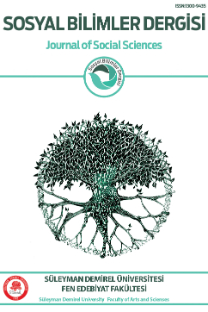Shaw’ın Silahlar ve Adamlar Oyununda Düzmece Vatanseverlik
Çalışma, Shaw’ın Silahlar ve Adamlar adlı oyunundaki düzmece vatanseverliği ve karakterlerin aptalca davranışlarını ele almaktadır. Onur, idealizm, kahramanlık, sosyal adalet, cinsiyet eşitliği, ikiyüzlülük ve sosyal hayatla ilgili daha birçok konu ve değerler Shaw’ın oyunlarının ana temasını oluşturmaktadır. Silahlar ve Adamlar oyunu da benzer konuları değinmektedir. Evliliğin romantizmi ve vatanseverliği oluşturan değişik unsurlar ele alınmıştır. Savaşın korkunçluğu, sevgi, umut, inanç, insanların yanlış ve sahte idealizmini değiştirmek için Shaw’ın çabası ve eleştirisi verilmiştir. Bu oyunda savaş, Balkanlarla sınırlı olmasına rağmen, Shaw, savaşı yıkım, kan dökme ve yoksulluk olarak gördüğü için acımasızca eleştirmektedir. Shaw’ın toplumsal ve ahlaki sorunlara karşı duyarlılığı, toplumdaki basmakalıp davranışı ve sahte idealizmi ve düzmece vatanseverliği değiştirme arzusu da ele alınmıştır.
Anahtar Kelimeler:
Kahramanlık, Shaw, Vatanperverlik
Pseudo Patriotism in Shaw’s Arms and the Man
This study aims to reveal the private follies of the characters in G.B. Shaw’s Arms and the Man in terms of their pseudo- patriotism. Honour, idealism, heroism, social justice, gender equality, hypocrisy, and a lot of other values of social life are the usual themes considered by Shaw in his plays. In this sense, his Arms and the Man is not an exception. Rather, romance of marriage and different inferable components of patriotism have been exposed with special emphasis and in greatly different depths and sincerity in this play. It is the influence of the disgusting image of squalid war, love, hope and faith that demonstrates the falsity and changeability of the idealistic beliefs of the individuals. Although the depicted war is restricted to the Balkans only, Shaw harshly criticizes it in general because, no matter, local or worldwide, the war’s unavoidable outputs are destruction, bloodshed and poverty everywhere. It also exhibits Shaw’s having a passion for social and moral problems: he ultimately desires to reform the society’s conventional behaviour and to rescue it from fake idealism and pseudo-patriotism.
Keywords:
Idealism War, Patriotism, Shaw,
___
- FRASER, G. (1954). “Bernard Shaw: 1950”, Bulletin (Shaw Society of America), May 1954, No. 5.
- HENDERSON, A. (1907). “George Bernard Shaw”, The North American Review, Jun. 7, 1907, Vol. 185, No. 616.
- HOFFSTEN, E. (1904). “The Plays of Bernard Shaw”, The Sewanee Review, Apr.1904, Vol. 12, No. 2.
- Oxford Advanced Learner’s Dictionary, (2000). Oxford: Oxford University Press.
- SATRAN, D. (2008). “The Chocolate Cream Soldier and the "Ghastly Failure" of Bernard Shaw's "Arms and the Man", Shaw, Vol. 28, (2008). 11-33.
- SAWYER, P. (1986). “The Last Line of the Arms and the Man”, Shaw, Vol. 6 (1986), 123-125.
- ŞEKERCI, Ö. (2015). Bernard Shaw İbsenciliğin Özü, İstanbul: İlgi Kültür Sanat.
- SHAW, G. B. (1965). The Complete Bernard Shaw Plays, London: Paul Hamlyn Ltd. ………………... (1973). “Preface to Plays Pleasant”, Arms and the Man, London: Longman.
- ………………... (1926). , Arms and the Man, New York: Dodd Mead & Company Publishers.
- ………………. (1981). “Preface: Mainly about Myself,” in George Bernard Shaw, Plays Unpleasant, G.B.: Cox &Wyman, Ltd.
- SYLVAN, B. (1965). “Bernard Shaw on Tragedy”, PMLA, Dec., 1956, Vol. 71, No. 5.
- TAN, İ. (2013). “The Nationalistic Elements in Shaw’s Arms and the Man and Namık Kemal’s Fatherland or Silistra”, Suleyman Demirel University, Institute of Social Sciences, 2013,
- WEISS, S. (1990). “Shaw “ Arms and the Man”, and the Bulgarians”, Shaw, Vol. 10, 1990.
- WILBUR, D. (1949). “The Essence of Shaw's Dramaturgy”, College English, Mar. 1949, Vol. 10, No. 6.
- ISSN: 1300-9435
- Yayın Aralığı: Yılda 3 Sayı
- Başlangıç: 1995
- Yayıncı: Süleyman Demirel Üniversitesi, Fen-Edebiyat Fakültesi
Sayıdaki Diğer Makaleler
Shaw’ın Silahlar ve Adamlar Oyununda Düzmece Vatanseverlik
KAÇAR HANEDANLIĞI DÖNEMİNDE İRAN ORDUSU
Pisidia Antiokheia'sında Hristiyanlık
Diğerleri için Duyulan Suç Korkusu
21. YÜZYIL TÜRKİYE’SİNDE MUHAFAZAKÂR MİLLİ MİMARLIK ARAYIŞLARI VE YANSIMALARI
SAĞLIK FONKSİYONU AÇISINDAN EDREMİT ŞEHRİ
